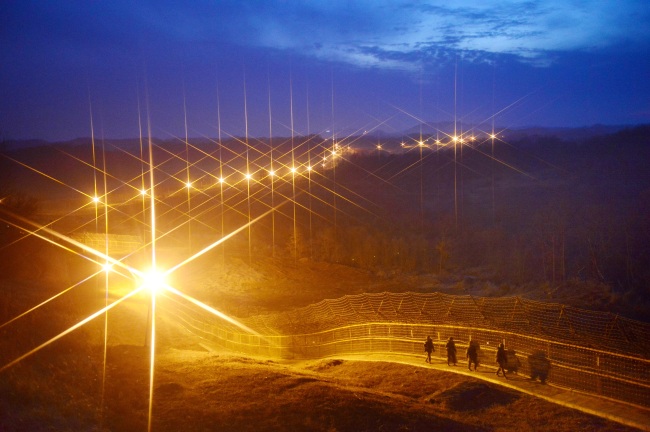Relations between the two Koreas are expected to continue to face a rocky road this year as they failed to build on rare momentum in recent months and the North could still stage major provocations.
Cross-border ties have quickly turned frosty since their first formal meeting in years broke down early last month due to irreconcilable differences in their positions on stalled tours to a North Korean mountain resort, reunions of separated families and other issues.
 |
| Soldiers patrol the border area in the western part of the Demilitarized Zone on Dec.27. (Yonhap) |
The biggest issue is a possible nuclear or long-range missile test, which will likely reactivate the vicious circle of international sanctions and potentially another provocation resulting in a months-long freeze in bilateral and multilateral dialogue.
With Seoul gearing up for a general election and Washington for a presidential vote, North Korea may well be put on the back burner, while China and Russia appear to be opting to maintain the respectively lukewarm bilateral ties with Pyongyang.
“The likelihood of North Korea’s fourth nuclear test is not so high in light of the increasing security cooperation between the South, the U.S. and Japan, and the resulting additional international sanctions. Plus, it wouldn’t want to let the strategic value of its nuclear weapons diminish by carrying out a hasty experiment without a strong conviction that it will beef up its nuclear capabilities,” the state-run Korean Institute of National Unification in Seoul said in its 2016 outlook.
“Still, there is the possibility that the North will use a nuclear test or threats as a diplomatic option depending on changes in its circumstances, especially in the face of Washington’s intensive pressure.”
Adding to the grim outlook is the death of Kim Yang-gon, the top North Korean official in charge of cross-border affairs, announced Wednesday by the North’s official media. As a secretary of the Central Committee of the ruling Workers’ Party and director of the party’s United Front Department, he led the Aug. 25 agreement that salvaged the two Koreas from the brink of a military clash.
“Given that Kim has been spearheading inter-Korean affairs since the Kim Jong-il era (began), his abrupt death could inevitably lead to a lengthy pause in cross-border dialogue,” said Chong Seong-chang, head of unification strategy research at the Sejong Institute.
“With Kim Yang-gon having played an international affairs secretary role, it could also delay Pyongyang’s efforts to improve China relations.”
Yet a few events could bring about a turnaround in the mood, including an envisioned visit by U.N. Secretary-General Ban Ki-moon to the communist state and one-on-one talks with leader Kim Jong-un. At the North’s first party congress in 36 years, slated for May, Kim is anticipated to unveil next-generation leaders and new economic, diplomatic and unification policies.
President Park Geun-hye, under mounting pressure to create a legacy in inter-Korean policy, could soften her line and make a concession on the tour program and lift bilateral sanctions imposed after the North’s 2010 attacks on the South’s corvette and the border island of Yeonpyeongdo.
“The Kim leadership would strive to flaunt its diplomatic feats around the party congress, for which it is expected to pursue a high-level meeting and greater economic cooperation with China and Russia,” said the Korea National Diplomatic Academy’s Institute of Foreign Affairs & National Security in its forecasts.
“If Kim manages to travel to Beijing and hold a summit, Pyongyang could agree to a freeze in nuclear provocations and restart the stalled six-party talks, yet even in that case it is unlikely to accept a full-scale denuclearization process.”
Despite the gloomy conditions, the Park administration should work to foster an upbeat atmosphere and revive the momentum for the next round of dialogue or possibly a summit, analysts say.
“The next official dialogue must take place, and for it to make progress, the Park government should make a bold decision on Mount Geumgangsan tours in exchange for family reunions,” Yang Moo-jin, a professor at the University of North Korean Studies in Seoul, said in his analysis.
“It also needs to propose an inter-Korean summit. Given the concentrated power given to both leaders, they could tackle various sticking points once and for all, and before the Aug. 15 Liberation Day should serve their best interests.”
By Shin Hyon-hee
(heeshin@heraldcorp.com)

